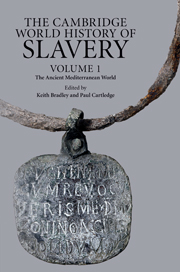Book contents
- Frontmatter
- Contents
- Series editors' introduction
- List of figures
- Acknowledgements
- Introduction
- 1 Slavery in the ancient Near East
- 2 Slaves in Greek literary culture
- 3 Classical Athens
- 4 The Helots: a contemporary review
- 5 Slavery and economy in the Greek world
- 6 The slave supply in classical Greece
- 7 Slavery and the Greek family
- 8 Resistance among chattel slaves in the classical Greek world
- 9 Archaeology and Greek slavery
- 10 Slavery in the Hellenistic world
- 11 Slavery and Roman literary culture
- 12 Slavery in the Roman Republic
- 13 Slavery Under the Principate
- 14 The Roman slave supply
- 15 Slave labour and Roman society
- 16 Slavery and the Roman family
- 17 Resisting slavery at Rome
- 18 Slavery and Roman material culture
- 19 Slavery and Roman law
- 20 Slavery and the Jews
- 21 Slavery and the rise of Christianity
- 22 Slavery in the late Roman world
- Bibliography
- General index
- Index of ancient passages cited
- Index of inscriptions and papyri
- Index of Jewish and Christian Literature Cited
3 - Classical Athens
Published online by Cambridge University Press: 28 September 2011
- Frontmatter
- Contents
- Series editors' introduction
- List of figures
- Acknowledgements
- Introduction
- 1 Slavery in the ancient Near East
- 2 Slaves in Greek literary culture
- 3 Classical Athens
- 4 The Helots: a contemporary review
- 5 Slavery and economy in the Greek world
- 6 The slave supply in classical Greece
- 7 Slavery and the Greek family
- 8 Resistance among chattel slaves in the classical Greek world
- 9 Archaeology and Greek slavery
- 10 Slavery in the Hellenistic world
- 11 Slavery and Roman literary culture
- 12 Slavery in the Roman Republic
- 13 Slavery Under the Principate
- 14 The Roman slave supply
- 15 Slave labour and Roman society
- 16 Slavery and the Roman family
- 17 Resisting slavery at Rome
- 18 Slavery and Roman material culture
- 19 Slavery and Roman law
- 20 Slavery and the Jews
- 21 Slavery and the rise of Christianity
- 22 Slavery in the late Roman world
- Bibliography
- General index
- Index of ancient passages cited
- Index of inscriptions and papyri
- Index of Jewish and Christian Literature Cited
Summary
INTRODUCTION
Classical Athens (500–300 bc) produced many of the modern icons of ancient Greece: the Parthenon, democracy and tragedy. But classical Athens by itself is not ancient Greece. Ancient Greece was a much larger and more diverse entity than ancient Athens, for the Greeks were not united politically: Athens, Sparta, Argos, Corinth, Thebes and thousands of other poleis or microstates were independently governed. Yet there was cultural unity, dependent on language, religion and a common, if variable, set of distinctive norms. Within that general Greek culture, Athens developed a unique portfolio of institutions and traditions, just as Sparta and every other Greek microstate did.
A huge array of extant sources demonstrates clearly that slaves were an integral part of ancient Athens, and scholars regularly refer to classical Athens (rather than ancient Greece) as one of the only five ‘genuine slave societies’ in world history. What does that term mean? Why does classical Athens qualify for inclusion under that label? This chapter is an extended answer to those questions.
To begin with the basics, there are two principal factors for qualification as a ‘slave society’ (rather than simply a society with slaves): the sheer number of slaves, relative to the population as a whole, and the significance of the role slaves played in the society at issue, especially economically. For most scholars, economics is fundamental to the classification: a society is a slave society if slaves played a vital quantitative and qualitative role in production, and the material basis of that society absolutely depended upon slave labour.
- Type
- Chapter
- Information
- The Cambridge World History of Slavery , pp. 48 - 73Publisher: Cambridge University PressPrint publication year: 2011
- 8
- Cited by

